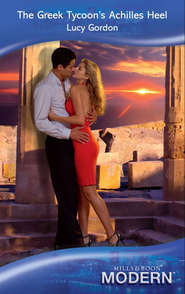По всем вопросам обращайтесь на: info@litportal.ru
(©) 2003-2024.
✖
His Pretend Wife
Автор
Год написания книги
2018
Настройки чтения
Размер шрифта
Высота строк
Поля
There and then she made up her mind that she was going to make him fall in love with her, and that would show everyone. Above all it would show him that he couldn’t look down on her from lofty heights.
Oh, God, she thought now, looking back down the tunnel of years, I was only seventeen. What did I know?
The house stood well back from the road, almost hidden by trees. It was large and costly, the residence of a wealthy, successful man.
It was dusk as Andrew drove up the winding drive, and there were no lights to greet him. But for himself the house was empty, and even he spent very little time here since his wife and son had departed. He had a bachelor flat near the hospital.
This grandiose place wasn’t a home to him. It never had been. He’d bought it three years ago to satisfy Myra, who’d fallen in love with its size and luxury. She’d been the wife of the youngest top-ranking cardiothoracic surgeon in the country, and she’d expected to live appropriately. Andrew had demurred at the house, which was almost a mansion, with a porticoed door and walls covered with ivy. But Myra had insisted, and he’d yielded, as so often, to conceal the fact that his feeling for her had died. If it had ever lived.
For a while she’d enjoyed playing lady of the manor. She’d named the place ‘Oaks’ after the two magnificent trees in the garden. She’d bought their son, Simon, a pony, and had him taught to ride in the grounds. But by that time their marriage had effectively been over. She hadn’t even wanted Oaks as part of the divorce settlement.
He was pouring himself a drink when his mobile went. It was Myra, which made his head immediately start to ache.
‘You’re no easier to get hold of than you ever were,’ she said wryly. ‘Where are you?’
‘The house.’
‘What are you rattling around in that place for?’
‘I can’t think.’
‘Just checking about the weekend. Simon’s looking forward to seeing you.’
‘Look, I was going to call you about that—’
‘Don’t you dare!’
‘I’ll have to work over the weekend. Can’t you explain to Simon, make him understand?’
‘But he already does understand, Andrew. It’s what he understands that should be worrying you. He understands that he’s always last on your list of priorities.’
‘That’s not true.’
‘Damn, it is true! Look, I married you knowing your work always came first. I made that choice. But Simon didn’t. He expects to have a father who loves him—’
‘Don’t dare say I don’t love my son,’ he barked.
‘Do you think I need to say it? Don’t you think he knows it every time you let him down?’
‘Put him on.’
The talk with his son was a disaster. Simon was quiet and polite, saying, ‘Yes, Daddy,’ and ‘It’s all right, Daddy,’ at regular intervals. And it wasn’t all right. It was all dreadfully wrong, and he didn’t know what to do about it.
He was tired to the bone. He microwaved something from the freezer, barely noticing what it was, then settled down in front of his computer. For two hours he worked mechanically and only stopped because his head was aching too badly for him to think. But that was good. He didn’t want to think.
He wondered why he suddenly felt so drained and futile. The demands of work were crushing, but they always were. Pressure, stress, instant decisions, life and death—these were the things he thrived on, without which he wouldn’t exist. Suddenly they weren’t enough. Or rather, they were too much. For the first time in his career—no, his whole life—he wondered if he could cope with everything that was required of him.
It was absurd to connect this sudden loss of confidence with the brief moment in the hospital corridor when he’d been confronted with a past he’d thought safely dead and buried.
Buried. Not dead.
He hunted in the top drawer of his desk until he found a set of keys, selected one, and used it to open the bottom drawer. At the back, buried under a pile of papers, was an envelope, stuffed with photographs. He laid it on the desk, but made no move to open it, as though reluctant to take the final step.
At last he shook out the contents onto the desk, and spread them out with one hand. They were cheap snaps, nothing special, except for the glowing faces of the two young people in them.
The girl’s long blonde hair streamed over her shoulders in glorious profusion, her face was brilliant with life. It was that life, rather than her beauty, that made her striking. All youth and abundance seemed to have gathered in her, as though any man who came near her must be touched by her golden shadow, and be blessed all his days.
Blessed all his days. There was a thought to bring a bitter smile to the face of a man who’d felt that blessing, and seen it die.
He lingered over the girl’s laughing face, trying to reconcile it with the weary look he’d seen on the woman in the corridor. Just once her gaze was turned on the young man, and he studied her expression, trying to detect in it some trace of the love he’d once believed in. In every other picture she was looking directly at the camera.
By contrast, the man had eyes only for her, as though nothing else in the world existed for him. His hands were about her waist or on her shoulder, touching her face, his expression one of tender adoration.
Andrew wanted to seize him, shake him, crying, You fool, don’t be taken in by her. She’s nothing but a cold-hearted little schemer, who’ll break your heart and laugh at you.
She’d been laughing when he’d first seen her at the party, dancing with blissful abandon. With her head thrown back in enjoyment, her eyes sparkling, she’d seemed the very embodiment of everything he’d given up on the day he’d decided to be the greatest doctor in the world. He’d devoted himself to study, ignoring the young, heedless pleasures that other medical students had seemed to find time for. They’d been all right for people who’d been satisfied with being ordinary doctors, but he hadn’t been satisfied, and he hadn’t been going to be ordinary.
Without warning this shimmering pixie had burst on him, and before he’d been able to control the feeling, he’d been filled with fierce regret for the whole side of life he’d rejected. He’d escaped to the kitchen, away from the sight of her.
But then she’d appeared, looking even younger close-up, and he’d known that she’d been dangerous to his peace of mind. He’d assumed an air of lofty indifference, talking to her with one eye still on his book, as though he hadn’t been able to tear himself away, although the truth had been that every fibre of him had been aware of her.
He’d have liked to believe her claim of being nineteen, but her air of bravado had given her away. She’d flirted like a kid, crossing her beautiful legs on the table near him, and saying she liked older men in a ‘come hither’ voice that would have finished him but for his stern resolutions. His advice to ‘go back to your party, pretty little girl’ had been an act of desperation.
He’d promised himself to avoid her, but when he’d seen boys getting her drunk for a laugh he’d had to step in and rescue her.
He’d taken the house key from her purse and carried her up the stairs to what he’d guessed had been her room. He’d removed her clothes because if her mother had found her fully dressed and asleep she might have guessed the truth. He was a doctor, and impersonal, so he’d thought.
But he’d found himself holding a girl wearing a bra and panties so wispy as to have been almost nonexistent. Laying her gently on the bed, he’d been shocked to find how his hands had longed to linger over her silky skin and perfect shape. He’d hung up her dress, using the controlled movements to impose discipline on his mind and, through his mind, his sensations. Discipline, control, order. That was how it had always been with him.
But not this time. Fear had seized him, and he’d got out as fast as he’d been able to.
He’d fled to the imagined safety of Lilian, a girlfriend as sedate and studious as himself. But there had been no safety there, or anywhere. After that it was too late. It had always been too late.
CHAPTER THREE
HETTA and Elinor shared their cramped little room both night and day. It meant that Elinor spent half her night listening for Hetta’s breathing, terrified lest her child had slipped away in the darkness. Each dawn she gave thanks that Hetta was still alive, and tried to convince herself that she wasn’t losing ground. Every morning she went to work and telephoned home after the first hour, to hear Daisy say, ‘She’s fine.’ In the late afternoon she hurried home at the first chance, anxious to look at Hetta’s face and lie to herself that the little girl wasn’t really looking paler or more tired.
There were the regular check-ups with the local doctor, who assured her that Hetta was ‘holding on’. And there were the further check-ups at the hospital, where Sir Elmer Rylance would make kindly noises.
‘I promise you Hetta is top of the list,’ he told her once. ‘As soon as a suitable heart becomes available…’
But day followed day, week followed week, and no heart ever became available.
If it ever did happen she knew she would be called at home, yet she couldn’t help a glimmer of hope as she and Hetta entered the cardiac unit for their April appointment. It was two months since she’d last been here and glimpsed Andrew Blake from a distance. In that time she’d managed to persuade herself that she’d imagined it.
There was a new nurse today, young and not very confident. She ushered Elinor and Hetta into the consulting room and seemed taken aback to find it empty.
‘Oh, yes,’ the nurse said quickly, ‘I should have told you—’











